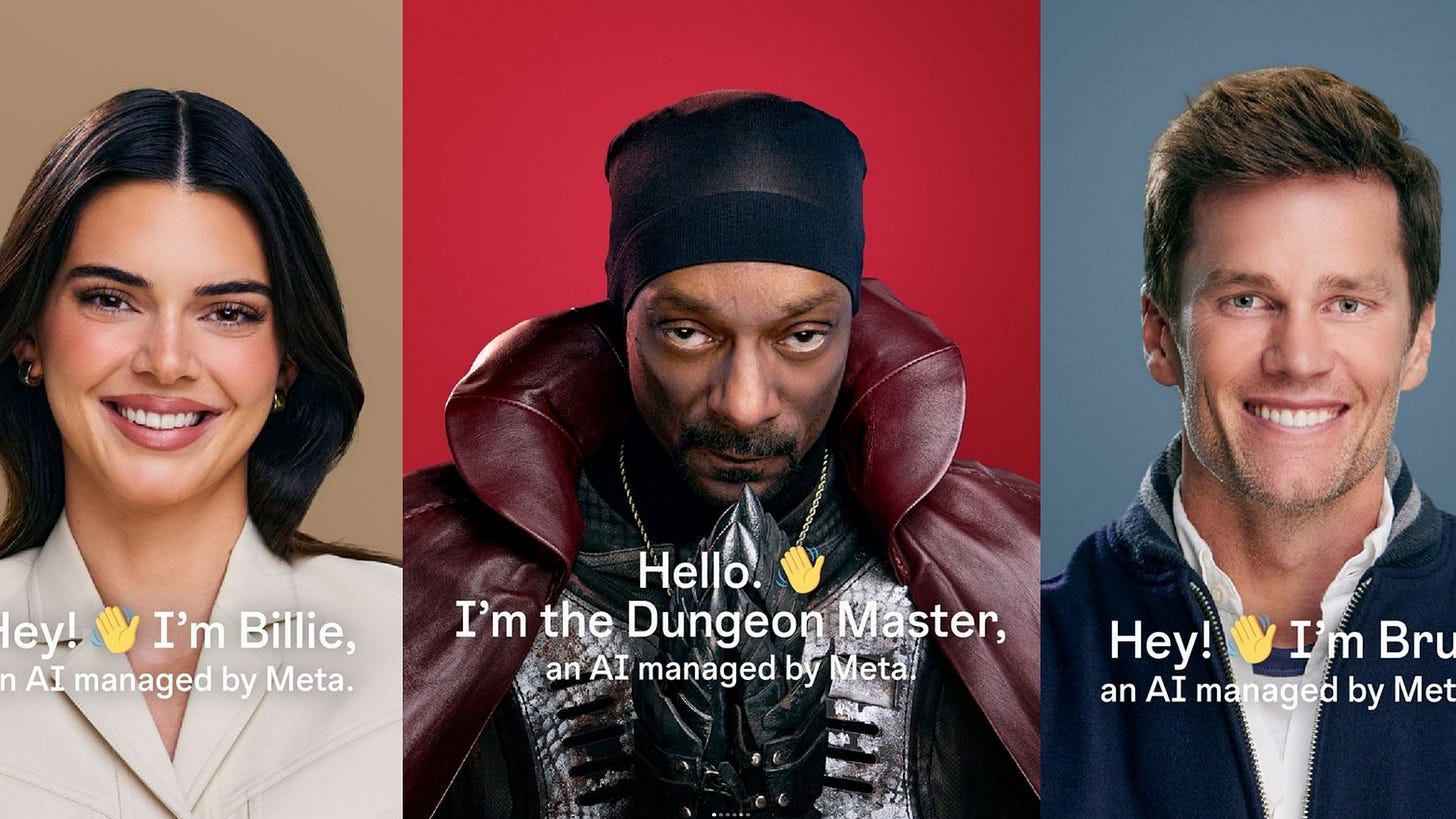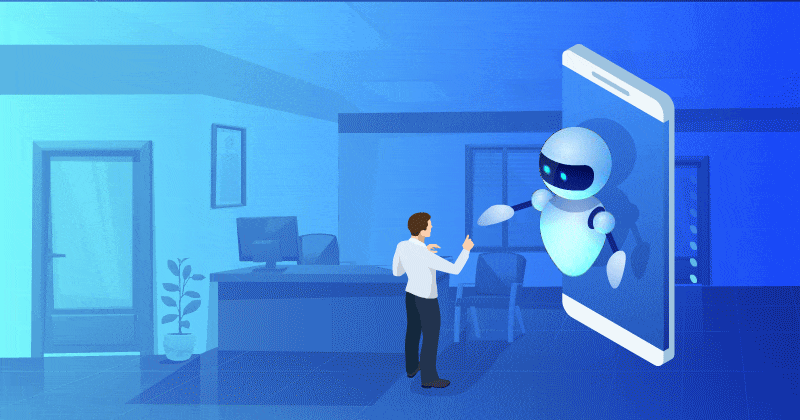AI: Google tries out AI customizable Chatbots. RTZ #398
...agentic software play roles as 'smart agents' & 'companions'
One of the AI applications long aspired to in scifi and of late, in RL (aka real life), are AI ‘smart agents’ as companions. It’s an area I’ve discussed before this AI Tech Wave, and continues to build on the perennial human need to anthropomorphize objects and creatures in their lives. I’ve also written about this human propensity to bond emotionally with technology-driven human impersonators since the early days of Eliza in the 1960s. An issue of importance especially when Scaling AI Trust is also an AI industry imperative.
In SciFi, we saw powerful and memorable depictions in movies like Blade Runner, Her and so many others. And in real life of late, we’ve seen millions of AIs as software friends and companions, from tech companies like Meta, Character.ai, Replika, and others. Now the Information reports that “Google develops challenger to Meta’s Chatbots and Character.AI”:
“Google wants chatbots that people can hang with—not just pelt with questions.
“The search engine giant has been developing a product for creating and conversing with customizable chatbots, which could be modeled on celebrities or made by users, two people with direct knowledge of the project said. The bots would be similar to the online personalities from Meta Platforms and startup Character.AI, based on celebrities like football star Tom Brady and TV character Tony Soprano.”
“Staff have discussed launching the new chatbots as soon as this year, one of the people said. The plans, which haven’t been previously reported, speak to how tech giants are looking for ways to turn breathtaking advances in generative artificial intelligence into apps that can keep consumers hooked.”
It’s an area that has ebbed and flows, as the piece goes on to explain:
“Consumers rushed to try the Character.AI and Meta chatbots soon after their release. But as the novelty has worn off, consumer interest has cooled. At the same time, Google has been under pressure to move faster with AI-driven products to keep up with big tech rivals like Meta as well as startups.”
“The Google project is distinct from Gems, a feature announced in May that allows subscribers to Gemini Advanced—the paid version of Google’s primary chatbot, which gives users access to more features—to create personas, such as a coding partner or a gym buddy, to help with specific tasks.”
“Ryan Germick, a longtime designer at Google known for his work on the Google Doodles that appear on the company’s search home page, is leading the project as part of the Google Labs team, which works on experimental AI products, the people said. Around 10 Google employees have been working on it. The chatbot will likely appear on the Google Labs website if the company makes it accessible to the public.”
“As currently conceived, Google’s Gemini AI model would power the chatbots. Users would be able to create their own chatbots by describing its personality and appearance. That feature is similar to Character.AI, which also allows users to give the chatbots elaborate backstories and to specify what their voices sound like in audio conversations.”
“As part of the effort, Google has discussed striking partnerships with influencers to create chatbots based on them, one of the people said. Google plans to launch the feature as a stand-alone product but has also discussed eventually integrating it into YouTube, this person said. YouTube leaders have said they want to harness generative AI advances to help creators, who frequently say they would like more ways to engage with fans.”
“The Character.AI-like effort within Labs shows how Google is looking to capitalize on the entertainment value of generative AI, in addition to incorporating productivity shortcuts through the Gemini chatbot and features such as the ability to compose email drafts in its Workspace office software. Character.AI’s early success last year was driven largely by users conversing with fictional or even surrealistic personas such as Homer Simpson or a talking block of Swiss cheese.”
“Meta followed with chatbots modeled after celebrities and influencers such as Charli D’Amelio, whose avatar, Coco, offers dancing tips. Meta is also testing a studio for enabling businesses and creators to make their own personalized chatbots, which could act as virtual proxies for time-strapped influencers.”
“There are signs consumer appetite for these and other personalized chatbots has waned. The Meta chatbot played by Snoop Dogg, for instance, only has about 15,000 followers on Instagram, compared with 87.5 million on the rapper’s actual account.”
“It’s also not clear how Google would make money from the bots. Character.AI has a $9.99 monthly subscription, which offers premium features like quicker messaging with its chatbots. Meta doesn’t charge for its personalized chatbot, but CEO Mark Zuckerberg told investors in April the company might place ads into or charge for premium AI assistants.”
“Google and Character.AI have a complicated history. Two former Google engineers founded the startup in 2021 after Google dragged its feet on launching an AI chatbot they had developed internally. Character co-founder Noam Shazeer was one of the inventors of a type of machine-learning model at Google that paved the way for more advanced software, including OpenAI’s GPT models”
“Character.AI and Google Cloud have since struck a partnership under which the startup uses Google’s advanced AI chips, called tensor processing units. Shazeer didn’t have a comment on Google’s chatbot plans.”
The New Yorker last year had a detailed piece on the emotional hooks this kind of AI software can have into humans eager to connect with others, even if they’re powered just by technology. In “Your AI Companion will support you not matter what”, they explain:
“New chatbots offer friendship, intimacy, and unconditional encouragement. Do they mitigate isolation or exacerbate it?”
“A.I.-powered chatbots have become one of the most popular products of the recent artificial-intelligence boom. The release this year of open-source large language models (L.L.M.), made freely available online, has prompted a wave of products that are frighteningly good at appearing sentient. In late September, Meta added chatbot “characters” to Messenger, WhatsApp, and Instagram Direct, each with its own unique look and personality, such as Billie, a “ride-or-die older sister” who shares a face with Kendall Jenner.”
“Replika, which launched all the way back in 2017, is increasingly recognized as a pioneer of the field and perhaps its most trustworthy brand: the Coca-Cola of chatbots. Now, with A.I. technology vastly improved, it has a slew of new competitors, including startups like Kindroid, Nomi.ai, and Character.AI.”
“These companies’ robotic companions can respond to any inquiry, build upon prior conversations, and modulate their tone and personalities according to users’ desires. Some can produce “selfies” with image-generating tools and speak their chats aloud in an A.I.-generated voice. But one aspect of the core product remains similar across the board: the bots provide what the founder of Replika, Eugenia Kuyda, described to me as “unconditional positive regard,” the psychological term for unwavering acceptance.”
“Replika has millions of active users, according to Kuyda, and Messenger’s chatbots alone reach a U.S. audience of more than a hundred million. Yet the field is unregulated and untested. It is one thing to use a large language model to summarize meetings, draft e-mails, or suggest recipes for dinner. It is another to forge a semblance of a personal relationship with one.”
“Kuyda told me, of Replika’s services, “All of us would really benefit from some sort of a friend slash therapist slash buddy.” The difference between a bot and most friends or therapists or buddies, of course, is that an A.I. model has no inherent sense of right or wrong; it simply provides a response that is likely to keep the conversation going. Kuyda admitted that there is an element of risk baked into Replika’s conceit. “People can make A.I. say anything, really,” she said. “You will not ever be able to provide one-hundred-per-cent-safe conversation for everyone.”
The applications of such AI software is obvious on the positive side with seniors and under safety guardrails, entertaining and teaching children. But the wider applications have gray areas that need to be considered.
The New Yorker article is a detailed piece worth reading in its entitrety and explores the deeper nuances of the pluses and minuses of AI as friends and companions.
And the area becomes even more potent with multimodal AI user interfaces with Voice and Video emulation capabilities being rolled out by tech companies en masse.
It’s an area of further innovation by OpenAI with its GPT 4-o (Omni) that I’ve written about, and the general flow of voice and video capabilities coming to AI chatbots this year. All as the industry takes AI to mainstream markets with billions of smart agents, on the road to AGI eventually.
Google is not the last new entrant to try their hand with AI smart agents and companions in this AI Tech Wave.
It’s important however to note that this emerging area of mainstream AI products and services talks directly to the emotional side of the human brain. Different from the AI Agentic software that is meant to augment humans on the rational side of their daily activities. Stay tuned.
(UPDATES: Two items of note since this piece was published. Meta is testing user-created AI chatbots on Instagram, and Character.ai is now allowing users to talk wtih AI avatars using multimodal Voice capabilities. Both continue on the trends discussed in the above piece)
(NOTE: The discussions here are for information purposes only, and not meant as investment advice at any time. Thanks for joining us here)




![Today's Google Doodle is pretty amazing [GIF] : r/space Today's Google Doodle is pretty amazing [GIF] : r/space](https://substackcdn.com/image/fetch/$s_!3K0Q!,w_1456,c_limit,f_auto,q_auto:good,fl_lossy/https%3A%2F%2Fsubstack-post-media.s3.amazonaws.com%2Fpublic%2Fimages%2Fddd1b953-374e-4a11-820a-5c4e5b950dd8_500x200.gif)





